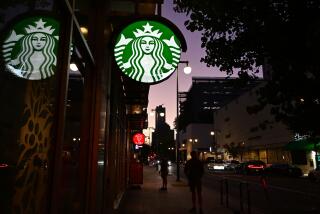Consumer Group Calls Sprint on Rate Claim
A San Francisco-based consumer group charged Tuesday that US Sprint used “misleading and deceptive advertising” in claiming that AT&T; customers pay “up to 50% more” for long-distance telephone service than do Sprint customers.
The group, Consumer Action, took issue with statements contained in brochures mailed last month to prospective customers. In a letter to the company and in a complaint lodged Monday with the California Attorney General’s office, Consumer Action maintained that “most Californians will not save that much on any of their calls.”
“The mailings are deceptive because they indicate that AT&T; customers who switch to US Sprint will save 50% on many, most or all of their long-distance calls,” charged the group’s spokesman, Ken McEldowney.
Herschel Elkins, senior chief assistant attorney general, said the complaint, if true, would pose “a substantial problem.” Elkins noted that the department had sued a US Sprint predecessor, GTE Sprint, over the way that company had treated consumer complaints and won a $500,000 penalty.
Range of Savings
US Sprint spokesman Syd Courson defended the company’s statements. Courson said the “up to 50%” claim was based on its rate for a one-minute interstate call such as one covering the 350 miles between San Diego and Phoenix. Sprint’s night or weekend rate for the call is 10 cents for the first minute, and AT&T;’s is 15 cents.
“We’re not saying that everybody, across the board, will get a 50% savings,” Courson said. One brochure, he pointed out, listed five sample calls, ranging from one minute to seven minutes and offering savings of from 9.1% to 50% over AT&T;’s rates; another brochure offered a similar range of savings on nine sample calls.
Consumer Action conceded that a 50% savings was possible on certain calls but said that it was not representative of the price difference between the AT&T; and US Sprint services. The group’s own recent sampling of 24 calls of varying distance and duration found that Sprint rates averaged only 3.03% less than AT&T;’s.
Reimbursement Asked
“Sprint and the other carriers have lower rates than AT&T.; But there is no justification for stretching the truth,” McEldowney said.
Consumer Action called on US Sprint to cease its claims and send clarifying letters to all who received its mailings. It added that Sprint should also offer to reimburse the local phone company connection charge, usually about $5, paid by any dissatisfied long-distance customer who switched from AT&T; to Sprint because of the sales promotion.
AT&T; spokesman Jeff Davis declined to comment beyond saying that consumers need “clear and accurate information.”
US Sprint is the nation’s third-largest long-distance carrier, with about 6.5% of the market, behind AT&T; and MCI Telecommunications. But the company has lost money since it was created as a joint venture between GTE Corp. and US Telecommunications in July, 1986, largely because of the cost of constructing a nationwide fiber-optic communications network.
Among US Sprint’s other problems is a class-action lawsuit it faces over billing snafus. The billing difficulties, apparently stemming from efforts to merge operations of the two parent companies, prompted the resignation last July of US Sprint’s first president, Charles M. Skibo.
More to Read
Inside the business of entertainment
The Wide Shot brings you news, analysis and insights on everything from streaming wars to production — and what it all means for the future.
You may occasionally receive promotional content from the Los Angeles Times.










